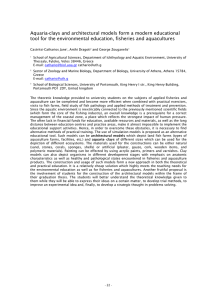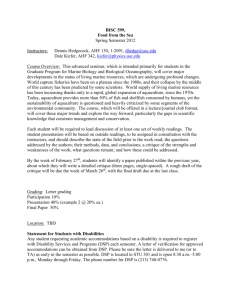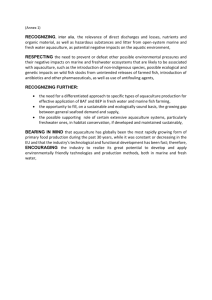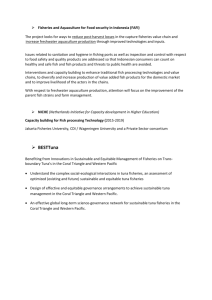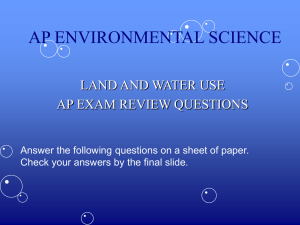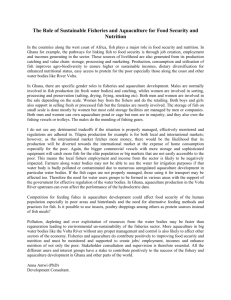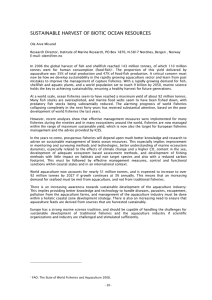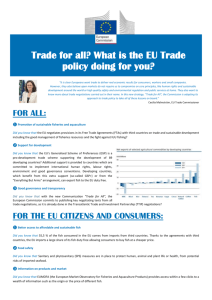Stella B. Williams , Simon Heck , Sloans Chimatiro and Ann Gordon
advertisement
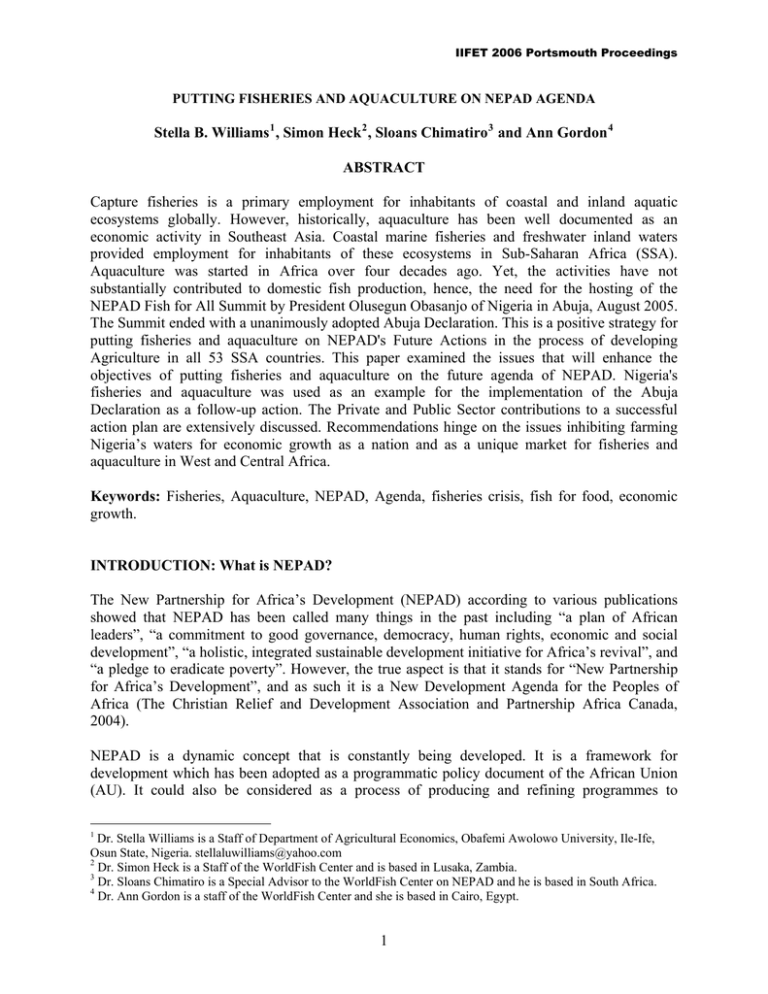
IIFET 2006 Portsmouth Proceedings PUTTING FISHERIES AND AQUACULTURE ON NEPAD AGENDA Stella B. Williams 1 , Simon Heck 2 , Sloans Chimatiro 3 and Ann Gordon 4 ABSTRACT Capture fisheries is a primary employment for inhabitants of coastal and inland aquatic ecosystems globally. However, historically, aquaculture has been well documented as an economic activity in Southeast Asia. Coastal marine fisheries and freshwater inland waters provided employment for inhabitants of these ecosystems in Sub-Saharan Africa (SSA). Aquaculture was started in Africa over four decades ago. Yet, the activities have not substantially contributed to domestic fish production, hence, the need for the hosting of the NEPAD Fish for All Summit by President Olusegun Obasanjo of Nigeria in Abuja, August 2005. The Summit ended with a unanimously adopted Abuja Declaration. This is a positive strategy for putting fisheries and aquaculture on NEPAD's Future Actions in the process of developing Agriculture in all 53 SSA countries. This paper examined the issues that will enhance the objectives of putting fisheries and aquaculture on the future agenda of NEPAD. Nigeria's fisheries and aquaculture was used as an example for the implementation of the Abuja Declaration as a follow-up action. The Private and Public Sector contributions to a successful action plan are extensively discussed. Recommendations hinge on the issues inhibiting farming Nigeria’s waters for economic growth as a nation and as a unique market for fisheries and aquaculture in West and Central Africa. Keywords: Fisheries, Aquaculture, NEPAD, Agenda, fisheries crisis, fish for food, economic growth. INTRODUCTION: What is NEPAD? The New Partnership for Africa’s Development (NEPAD) according to various publications showed that NEPAD has been called many things in the past including “a plan of African leaders”, “a commitment to good governance, democracy, human rights, economic and social development”, “a holistic, integrated sustainable development initiative for Africa’s revival”, and “a pledge to eradicate poverty”. However, the true aspect is that it stands for “New Partnership for Africa’s Development”, and as such it is a New Development Agenda for the Peoples of Africa (The Christian Relief and Development Association and Partnership Africa Canada, 2004). NEPAD is a dynamic concept that is constantly being developed. It is a framework for development which has been adopted as a programmatic policy document of the African Union (AU). It could also be considered as a process of producing and refining programmes to 1 Dr. Stella Williams is a Staff of Department of Agricultural Economics, Obafemi Awolowo University, Ile-Ife, Osun State, Nigeria. stellaluwilliams@yahoo.com 2 Dr. Simon Heck is a Staff of the WorldFish Center and is based in Lusaka, Zambia. 3 Dr. Sloans Chimatiro is a Special Advisor to the WorldFish Center on NEPAD and he is based in South Africa. 4 Dr. Ann Gordon is a staff of the WorldFish Center and she is based in Cairo, Egypt. 1 IIFET 2006 Portsmouth Proceedings strengthen Africa. Thus, NEPAD could be perceived as a guiding star, to be closely followed and whose movements can help Africa to navigate towards a brighter and better Africa. Yet, this star is not only to be followed, but also influenced and guided as well by the peoples of Africa (crda@telcom.net). Why NEPAD? There was scepticism about previous development initiatives in Africa. However, the reason for NEPAD is simple. The initiative is anchored in the determination of Africans to extricate themselves and the continent from the malaise of underdevelopment and exclusion in a globalizing world. Strengthening Africa’s profile and role in the global framework required a pragmatic policy document like NEPAD. The international community has also much to lose as poverty in one corner of the world can destabilize the world as a whole. Moreover, the economies of developed nations may stagnate. Thus, serious efforts have been put into the world’s activities in its path of sustainable development through developing partnerships and sharing a common vision of peace and prosperity (pac@telecom.net). Whom Does NEPAD Belong To? In the 18th, 19th and 20th century, several movements for a united Africa existed. Some were Black Consciousness, Pan Africanism, Ubuntu and Negritude and in the last century these movements were associated with political figures like: Nkrumah, Nyerere and Denghot just to name but three of the noble political Africans in the 1950s and 1960s. However, President Mbeki of South Africa, President Wade of Senegal and President Obasanjo of Nigeria as well as President Bouteflika of Algeria and President Gaddaffi of Libya have all played a major role in the current movement for a united Africa, which in the 21st century has been the NEPAD as its principal document. It is significant to note that many documents were merged to create NEPAD as it is now known! Some of the documents included the “Millennium Partnership for the African Recovery Programme, (MAP”, the “Omega Plan for Africa”, and a “Compact for African Recovery”. The final draft was adopted by Heads of State at their summit in Lusaka in 2001 as “A New African Initiative,” later to be renamed as NEPAD (crda@telecom.net). NEPAD will belong to whoever transformed it into action, as a vision can belong to all who accept it. But what matters is who implemented it. Hence, the importance for all to participate in its implementation. This concept was the underlining reason why the Team from the WorldFish Center decided that the IIFET 2006 Conference in Portsmouth, UK should be a place to share information from the NEPAD Fish For ALL Summit with all the Scientists and Economists interested in Africa’s Fisheries and Aquaculture Development. The NEPAP Fish For All Summit was held in Abuja, Nigeria from 23 to 25th August 2005 primarily for the Continental involvement of all coastal and landlocked nations to participate in the discussions of issues of fisheries and aquaculture development. This programme took forward the agenda and momentum for fisheries and aquaculture in particular. It created an opportunity for the re-visiting of the role and contributions of fisheries and aquaculture in Africa’s agricultural development programme in general. This is because the Comprehensive Agricultural document prepared for agriculture for the Continent missed out a document on 2 IIFET 2006 Portsmouth Proceedings fisheries and aquaculture. Thus, the outcome from the workshops and summit will have a companion document that can be adopted as the Comprehensive Document for Africa’s agenda on fisheries and aquaculture. The primary objective of the NEPAD programme was mainly to define and promote innovative approaches to the development of fisheries and aquaculture in Africa. The approaches employed focused on the understanding and increasing the development value of fisheries and aquaculture. That is, the current and potential future value of the sector in terms of environmental services, economic growth, human health, food and nutrition security, social inclusion and other development objectives that have been identified by African countries and at global level. Thus, the WorldFish Center’s fundamental value for its work in Africa was most important in the issue of decision making as well as policy perspective for the Continent. Hence, the programme was a positive way of generating lessons, documenting information on resources and approaches for the Center’s global programme for the 21st century. Regional Background Africa’s fisheries and aquaculture before and after the NEPAD Fish For Summit held in August 2005 were at a turning point for many reasons. Some of the reasons included poverty reduction of rural coastal and inland fishers; depletion of fish stocks through the use of industrial fishing vessels; food security and its impact on animal protein supply just to name a few. In general, the rural coastal fishing communities make very vital contributions to the food and nutritional security of millions of Nigerians and at the same time provide income for hundreds of fishers engaged in capture fish production, processing and trade. For example, in Nigeria, a fisheries product such as shrimps has become a leading foreign exchange earner for commercial industrial producers. In Mauritania, Angola, Senegal and South Africa, the capture of various types of fish species are foreign exchange earners for the particular nation mentioned. However as result of the depletion of these fish species, the benefits from capture fisheries are at risk due to the rapid depletion of natural aquatic stocks. It is for this reason that demand far exceeded the supply of fish products for both domestic and international consumption. Aquaculture is being developed to serve as an alternative source of fish supply outlet which is yet to fulfill the expectations of the people. This process of fulfilling the expectations of the people in the Fisheries and aquaculture sector of Agriculture will make vital contributions to food and nutrition security of millions Africans. Practically, it will provide income for over 10 millions fishers who are already engaged in capture fisheries, processing and preservation of these capture products and trade. Methodology for Preparation for the Summit The methodology employed by the WorldFish Center was to hold three workshops in the areas of fisheries and aquaculture regionally. The first workshop was held in Malawi focusing on Inland fisheries, next was a second workshop in Senegal on Industrial/Commercial fisheries. Both of these first two workshops were on capture fisheries and the last workshop was on aquaculture. This workshop was held in Egypt where the WorldFish Africa and West Asia Headquarters is based. The positive aspect of these preparatory workshops was to ensure that the regional meetings covered the geographical areas of the Continent. Malawi covered Eastern and Southern Africa and served to ensure that COMESA as a Regional Organization was 3 IIFET 2006 Portsmouth Proceedings strengthened while the meeting in Senegal empowered the ECOWAS Organization while the meeting in Egypt empowered the Northern and West Asia Organizations. Reports from the three workshops were used as the baseline for the Summit proper held in Abuja Nigeria. At the Summit a wide-ranging Plan of Action that set out in principle to protect and develop Africa’s key fisheries and Aquaculture projects. The Abuja Declaration was adopted in Principle by all Heads of State and Government at the NEPAD Fish For All Summit on 25th August 2005. Thus putting fisheries and Aquaculture in NEPAD Agenda is the most critical development process for the 21st century for the African Continent. Relevance of Putting Fisheries and Aquaculture in NEPAD’s Agenda? The first question asked in writing this paper is: of what relevance is putting fisheries and aquaculture in NEPAD’s Agenda? The answer is simple. The New Partnership for Africa’s Development (NEPAD) has no Comprehensive Africa Agriculture Development Programme (CAADP) – Companion Document on fisheries in its future development agenda. The second question as a follow-up with the first question is: why should it make any difference if NEPAD has a companion document for agriculture that does not include fisheries and aquaculture? Again the answer is simple. On the African Continent, fisheries contribute significantly to food and nutrition security of an estimated 200 millions people (NEPAD Technical Review Paper on Aquaculture, 2005). Fish has become a leading export commodity for Africa, with an annual income of US$2.7 billion. Yet these benefits are at risk as the exploitation of national fish stocks is reaching their limits while aquaculture production has not yet fulfilled the expected potential. For example, fishing activities provided income for more than 10 millions people who are engaged in fish production as well fish processing and trade. In 2002, the supply of fish products from the Continent was approximately 7.3 million tones (FAO, 2004). Approximately 66% (4.8 million tones) of this output was from the marine coastal regions while the remaining (2.5 million tones) was from the inland waters. However, for sometime, the reported output from capture fisheries in particular has stagnated meaning that there is need for an alternate supply chain if the rising demand for fish products are to be met. On the other hand, since the dawn of the 21st century, fish supply from the aquaculture sector continued to increase within the African continent. The summary of fisheries and aquaculture reports clearly indicated that putting fisheries and aquaculture in the overall NEPAD Agricultural development agenda in the 21st century will not only produce more fish to meet demands, it would definitely make a difference in the Continent’s priority developmental programmes for poverty eradication and improved food security. Table 1 below showed the regional share of aquaculture production in comparison to the world’s production. 4 IIFET 2006 Portsmouth Proceedings Table 1: Regional Share of Aquaculture Production versus World’s Aquaculture Production in 2003 Regions Asia Europe South America North America Africa Percent World Production (%) 91.0 4.0 2.0 1.6 1.4 Source: FAO, 2004 Asia topped the list with a 91% share followed way behind by Europe with a mere 4%, then came South America and North America with about 2% while Africa took the rear with only 1.4%. This situation must change if Africa truly desire to reduce poverty and improve food security and malnutrition. Hence, the importance of the wake-up calls through the regional workshops on: Inland (Malawi), Industrial (Senegal) and aquaculture (Egypt). The reports from the three Technical workshops set the stage for the Summit proper and the production of the Companion Document on Fisheries and Aquaculture as a substantive document for the NEPAD Agriculture programme for the African region. According to the reports from various studies by FAO, WorldFish Center and other institutions and authors, Egypt accounted for the lion share of the aquaculture production in Africa - 86% of total; Nigeria is a distant second with about 7% of the total and Madagascar with about 2% for the total. The ten producing countries include: Egypt, Nigeria, Madagascar, Tanzania, Ghana, South Africa, Zambia, Uganda, Democratic Republic of Congo, Tunisia and Zimbabwe. Table 2 below summarized aquaculture production by these ten nations between 2001 and 2003. It is only in Egypt that one observed significant growth in production from 85, 00 tonnes produced in 1997 increased to 445,181 tonnes by 2003. Table 2: Summary of the largest aquaculture producing African countries, 2001 -2003 (Tonnes) Country 2001 Egypt 342,864 Nigeria 24,398 Madagascar 7,749 Tanzania 7,300 Ghana 6,000 Zambia 4,520 South Africa 4,329 Dem. Rep. of Congo 2,744 Uganda 2,360 Zimbabwe 2,285 Country 2002 Egypt 376,296 Nigeria 30,663 Madagascar 9,713 Tanzania 7,630 Ghana 6,000 South Africa 5,555 Uganda 4,915 Zambia 4,630 Dem. Rep. of Congo 2,965 Zimbabwe 2,213 Source: FAO, 2004 5 Country 2003 Egypt 445,181 Nigeria 30,677 Madagascar 9,507 South Africa 7,720 Tanzania 7,002 Uganda 5,500 Zambia 4,501 Dem. Rep. of Congo 2,600 Zimbabwe 2,600 Tunisia 2,130 IIFET 2006 Portsmouth Proceedings The relevance of both Tables 1 and 2 is that the population growth on the African Continent is projected to hit 1.2 million mark by 2010. Reports have shown that with the depletion of coastal and inland fisheries there is need to develop an alternative supply process, hence the desire to improve the current supply of food fish from aquaculture so that the demands can be met as required. Both IFRI and the WorldFish Center carried out a joint study and the results from the study indicated that if the averaged consumption of food fish is to be maintained at 8kg per individual per annum, then the supply of fish products will have to be increased one-half fold by 2020. To achieve this proposal aquaculture development must be improved and its growth must be higher than what it is presently. The Egypt workshop deliberated extensively on this issue and it was agreed that there is great physical potential for aquaculture on the Continent. For example, 30% of the land area on the Continent is estimated to be available and suited for small-scale aquaculture production. Based on the information summarized in Table 1, if the Technical capacity is strengthened and if there is collaboration and linkage with development partners, then, there is hope that production can improve as rapidly as has happened in Egypt for example. Presently, the WorldFish Center Headquarters for Africa and West Asia is based in Egypt. One can only guess that with the presence of the WorldFish Center’s collaboration and linkage, Egypt has benefited immensely both technically and otherwise. The same is also true of another nation like Malawi that has a WorldFish Center’s Regional Outreach office established in Zomba. Additionally, Malawi has technical aid from the Japanese Government (JICA). The presence of both the WorldFish Center and JICA in Malawi will in the nearest future impact on its aquaculture development programme. Other African countries like Nigeria, Ghana, Tanzania, Zambia, South Africa, Democratic Republic of Congo, Uganda and Zimbabwe too will sooner than later begin to benefit from the collaborations of the World Bank and the WorldFish Center’s inputs from training to improve the capacities of the National Research Institutions as well as the Universities within these countries. The NEPAD Fish For All Summit have created a platform on which future research and technical trainings of Africans can obtain the felt needs as summarized in the Abuja Declaration. This document was unanimously adopted by all the African Representatives to the Summit. What is needed now is the follow-up Actions to put in place plans to achieve the various recommended projects. Resultant Impact of the NEPAD Fish for All Summit Resulting from the NEPAD Fish For All Summit and Workshops held in preparation for the Summit in 2005 as well as the Workshop held in Portsmouth, UK, - IIFET 2006 Conference, the programme has seen the need to change the rules of the game for fisheries and aquaculture in more than one way. For example: • A NEPAD Network group was established by the members of IIFET at the Conference to ensure engaging Economists and Scientist with significant data and information on African fisheries and aquaculture in future activities. Additional, documents from these Economist and Scientist should be collated into a Book for reference publications for information and knowledge achieve for use on the continent; 6 IIFET 2006 Portsmouth Proceedings • • • • The Summit and preparatory meetings established a development oriented agenda in which the sector is accountable for its contributions to wider societal goals; It strengthened the demand for research and knowledge to justify and guide investments in the sector by government, international partners, private sector, NGOs and so on; It thereby linked the research agenda directly into policy and investment planning and creates new and potentially more sustainable funding mechanisms and increases accountability of research to stakeholders; and, It created impact pathways of research into policy and investment planning. The Future of Building a Relationship between Asia and Africa There is currently a move by Asian countries like China, Japan and Malaysia to name but a few of those with current economic collaborations with African nations have increased their partnership and developmental relation with as many African countries as possible. For example, Nigeria has signed an MOU with China and Malaysia for Technical and Financial Aid. Japan on the other hand is expanding her relationship in Eastern Africa with Malawi and Ethiopia on this nation’s priority list for Technical and Financial Aid. The United Kingdom too has special Technical and Financial Aid for Developing countries in Asia and Africa (DFID). DFID has sponsored aquaculture projects in Bangladesh which African nations can benefit from the technologies that have successful improved the livelihoods of the rural populations. Collaborative research and transfer technologies that have been tested in Asia can be of great assistance to African countries in the development of Aquaculture. NEPAD Fish for All Action Plans The Summit demonstrated clearly that if strategic investments that are urgently needed are carried out quickly, it would safeguard the future of Africa’s fisheries and aquaculture sector of Agriculture. This action will lead to poverty alleviation resulting in regional economic development. In order to meet these needs the overall Technical objectives of the Action Plans: • • To support, and where possible increase, the long-term production of fisheries and aquaculture through sustainable use of aquatic resources that has application of environmentally sound technologies; To strengthen food security and trade benefits for Africa’s sustainable development through improved access of African fisheries and aquaculture products for domestic and international markets. Thus, in recognizing the vital contributions by African inland and marine fisheries for food security and income of many millions of Africans and the growing situations as well as the emerging successes of aquaculture development in the region, there were consultations made within the umbrella of NEPAD. These consultations identified the primary areas for investment to safeguard further increase these benefits, together with a first set of priority issues. Hence, the adopted NEPAD Fish For All Action Plan described these investment areas for inland and marine fisheries and aquaculture. 7 IIFET 2006 Portsmouth Proceedings For Inland Fisheries: • • • • • • • Improving fisheries governance and defining resource access; Enhancing productivity through post harvest management; Sustaining production through integrated water resource management; Supporting trans-boundary management; Improving market access, in particular for small-scale production and the traders; Promoting enterprise development through enabling institutional framework; Strengthening consideration of inland fisheries in national activities and actions on food security. For Coastal and Marine Fisheries: • • • • • • • • Preparation and implementation of long-term fisheries management and supportive policies for sustained production; Building capacity of African countries to harness the full benefits of coastal fisheries; Improving fisheries governance and participatory management; Improving management of the coastal and marine environment; Strengthening the access of African fisheries to regional and national in fish products; Supporting post-harvest activities through adequate investments; Promoting enterprise development through enabling institution; Strengthening consideration given to coastal and marine fisheries in terms regional policies and actions on food security. For Aquaculture: • • • • • • • • • • Developing sector-wide strategies at national level for expansion and intensification of aquaculture; Supporting priority aquaculture zones; Encouraging private sector investment across the sector; Applying proven technologies to increase production; Maintaining the competitive advantage that Africa’s environment provides for aquaculture production; Harnessing the opportunities for small and medium enterprises by expanding domestic markets for fish, including growing urban demand for fresh fish products; Supporting the emerging regional trade in aquaculture products; Harnessing the opportunity of expanding export markets for high value fish products thereby increase investment in African aquaculture production and processing; Expanding the adoption of integrated small-scale aquaculture thereby increasing rural productivity and food security; Exploiting the potential of aquaculture production to contribute positively to the programmes. 8 IIFET 2006 Portsmouth Proceedings Resultant Impact of Outcomes: The WorldFish Center and other International Developing Funding Agencies like the World Bank, Norway (NORAD), Sweden (SIDA) and others that are Interested in development projects in Africa. It is therefore proposed that the implementation of the NEPAD Fish For All Action Plans should follow a framework with an approach with fast-track programmes for immediate action. This should focus on areas of strategic regional importance and current economic growth which would provide a learning process for subsequent expansion of activities. In addition, pertinent lessons and experiences from regions and sectors are effectively applied to accelerate the development of fisheries and aquaculture. The Action Plan would serve as an Africa-wide framework for developing specific interventions by stakeholders. These would be stakeholders at Regional Economic Community and National Economic Forum by taking into account on-going initiatives and development priorities. All these would enable the stakeholders (nations, organizations and communities) to draw on NEPAD –CAADP for expansions of successful initiatives. These Actions would address critical capacity and strategies that would link the Actions to relevant knowledge technologies in other regions (Asia for example). The full text of the NEPAD Fish For All Action Plan can be found in the website (http://nepad.org/2005/files/fishforall.php). African Governments Unanimously Adopt Abuja Declaration on Sustainable Fisheries and Aquaculture HE, Chief Olusegun Obasanjo, President of Nigeria, concluded the four day NEPAD FISH FOR ALL SUMMIT by announcing adoption of the Abuja Declaration on Sustainable Fisheries and Aquaculture in Africa at the Secretariat of the Economic Community of West African States (ECOWAS). The Declaration was agreed at an assembly of high-level government leaders that included representatives from many African nations. The Declaration endorses an Action Plan completed during the technical meetings 23-25 August 2005. There were 100 experts from across the continent. The Action is based on five point strategy that focuses on supporting capture fisheries developing aquaculture, improving fish market chains, increasing benefits from fish trade. Said President Obasanjo: “If Africa’s per capita consumption of fish is just to be kept at the present level, though grossly low and unacceptable. Fish production must be increased by 250 percent by 2015. This, unhealthy situation calls for urgent action and indeed pose a great challenge to all of us.” The full text of the Declaration can be accessed at the WorldFish Center website www.worldfishcenter.org Summary and Conclusion NEPAD is a good forum for the improvement of fisheries and aquaculture development in Africa. The partnership of the WorldFish Center and FAO to provide technical support was very timely. The development and donor partners’ contributions of financial support to effect the 9 IIFET 2006 Portsmouth Proceedings NEPAD Fish for Summit in Nigeria was also a great beginning for something better to happen on the continent. Overall, the programme under the coordination of the WorldFish Center is beginning to shift the Center’s role in Africa towards that of a comprehensive science partner which is well linked to development agenda in the region. This would facilitate the development of a research agenda by African stakeholders, joint mobilization of resources with African stakeholders, and facilitating and mentoring of African scientists to generate new knowledge and feed it into policy and investment programmes. In the process, the AU/NEPAD programme is long-term demand for the WorldFish Center’s work in the region. The WorldFish Center has a huge responsibility to facilitate the transition – the first step has been done through the NEPAD Fish For All initiative and summit. What is happening now is to use this momentum to demonstrate how it will work in practice. At the end of the day, investments in fisheries and aquaculture research in Africa will substantially increase and governance of the research process will improve. Appreciation The Center would wish to thank the IIFET Local Organizing Committee for the kind consideration of the Team’s application to hold a Workshop at the Conference in Portsmouth, UK to share the outcome of the summit held in Nigeria in August 2005. Also, the Team is most grateful to all the IIFET participants who attended the workshop for their comments and suggestions on how to improve the WorldFish Center’s activities in Africa. The Team is very pleased with the African Network Group established at the end of the workshop. This network will assist the Center in its future Actions in the continent. Bibliography The Christian Relief and Development Association and Partnership Africa Canada (2004). NEPAD in PERSPECTIVE: A New Development Agenda for the Peoples of Africa. Flamingo Printing Press.32p. The WorldFish Center (2005). NEPAD Fish For All Summit. Penang, Malaysia (www.worldfishcenter.org). 10
